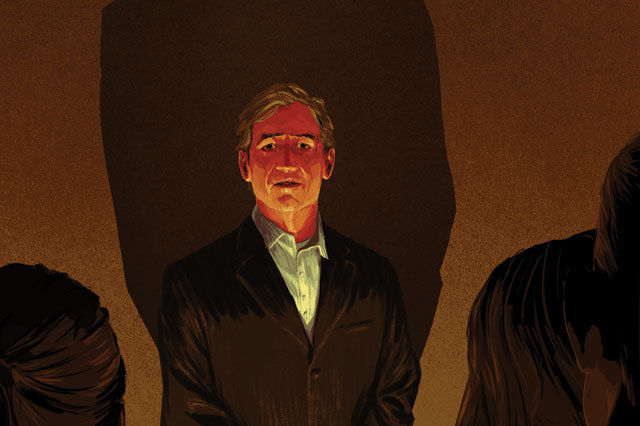
Andrew Fastow Plots an Afterlife
"I'm always surprised when people ask me to speak about business ethics; it’s like getting Kim Kardashian to speak about chastity.”
These words, from the lips of Andrew Fastow, elicit generous laughs from a roomful of bankers and attorneys at Dallas’s Belo Mansion this past September. Over the course of the next hour, he will give a talk on the subject of corporate ethics entitled “Rules Vs. Principles” to the local chapter of the Turnaround Management Association, a talk regularly punctuated with lines like the above, lines designed to show he is fully aware of the evening’s irony. Fastow is bluntly, emphatically apologetic throughout, regularly returning to a mantra he seems to genuinely embrace: “I went to jail because I was guilty.”
He is in his early 50s but looks younger, especially for a man who spent five years in federal prison following his indictment by a federal grand jury—and subsequent guilty plea—on 78 counts of money laundering, fraud, and conspiracy. He looks handsome in an Aaron Sorkin sort of way, charming and charismatic, brilliant and quick-witted. Watching Fastow in Dallas, it’s easy to see how he became Enron’s financial wunderkind, CFO of what would become the seventh-largest company in America, at 36.
And then, a month and a half after his Dallas engagement, his nationwide redemption tour makes a stop in Houston.
It is a cool, rainy night downtown, and the ballroom at the Magnolia Hotel is as packed as Belo’s was. The speaker and his talk are the same, and the resemblance between Houston’s well-groomed, besuited TMA members and Dallas’s is uncanny. Still, something seems different. We notice that Fastow doesn’t seem to have gotten a haircut in the intervening weeks. We notice that he appears a bit disheveled and fidgety as he ascends to the podium.
“This is very uncomfortable for me,” he begins after a short, pensive silence. “Every time I do one of these presentations it’s uncomfortable, but especially so in Houston. I apologize ahead of time if I seem nervous, but I am.” A few minutes later, he gains enough footing to address the scandal head-on: “It embarrassed Houston tremendously. The impact on Houston was substantial. I wake up to this every day. I am tremendously embarrassed, ashamed, and most importantly, I’m very sorry.”
Many people, even former Enron employees, don’t seem to realize that Fastow is back. Released from a Louisiana federal prison camp in 2011, he returned to the Bayou City, his wife, Lea, and the couple’s two sons. Lea spent only one year in prison for her small role in the Enron financial scandal—she pled guilty to income tax fraud—while Andrew served a year for nearly every one he spent as CFO, every year he spent concocting new special-purpose entities to mask Enron’s enormous debts and support the off–balance sheet financing and mark-to-market accounting schemes that finally brought the company down. Enron presaged later scandals at Wall Street’s “too big to fail” banks and ushered in the Sarbanes-Oxley act, aimed at preventing such failures and frauds from disrupting the American economy in the future.
As his introductory remarks sink in, Fastow plunges into “Rules Vs. Principles” again—drawing laughs still, though strained this time—and fumbles through the same slides. The post-presentation Q&A session isn’t nearly so friendly as the one in Dallas. There is aggressive questioning from a few former Enron employees, including one whistleblower. “Nothing you say will offend me,” Fastow promises before the questions commence. “I don’t think I can get offended at this point in my life.”
As to why Fastow would submit to this sort of treatment, well, perhaps he is fashioning an afterlife for himself as a whistleblower too. He’s too late for his old company, of course, whose 2002 implosion left more than 4,000 Enron employees jobless and various pension funds bereft of an estimated $1.5 billion. But if he hurries, if he gives enough talks like these around the country, at places like Stanford and Harvard, or at the University of Colorado, where he teaches a yearly ethics course, he might just prevent another Enron. Or so the thinking goes.
His message: the same accounting practices that brought down Enron and landed him in prison—practices that allow a company to operate as if it’s much more profitable and stable than it really is, practices that aren’t illegal when done correctly—are still in wide use today. Operating this way is technically known as “believing your own bullshit,” according to Fastow, and is as much a threat to corporate America as Department of Justice investigations and federal indictments.
Creative accounting is everywhere, he says, from the SPEs used by GM to hide its mounting debt, to the elaborate tax shelter Apple gained by moving its global headquarters to Knocknaheeny, a suburb of the Irish city of Cork. He shows us a set of slides he made for his Colorado students demonstrating how their own university’s accountants create a more favorable debt-to-asset ratio, using techniques the students initially consider unethical. Their thinking evolves, however, once Fastow tells them that such number-crunching allows the university to keep tuition costs down. There’s nothing wrong with a little creative accounting, the students tell him, much to his chagrin.
As compelling as his presentations are, he is aware that many in the audience, especially here, have come not to see Fastow the whistleblower but Fastow the whipping boy. “No one ever asked me to give a presentation when I was CFO of Enron,” he observes at one point. “But I get invited every week to give a presentation now, and the only reason is because I was in jail.”
Fastow has brought visual aids to further illustrate his point. The first is an elegant, colorful glass trophy he was awarded as CFO of the year in 2000. “It’s gotten a little beat up over the years,” he says, pointing to a particularly well-worn detail. “It used to have a star here; it fell off. Now it just looks like it’s giving me the finger.” The audience cackles, as if on cue. “If you go back and read the article in CFO Magazine,” Fastow says, “I was given this award for doing off–balance sheet financing, which of course, today, is a pejorative.”
The second visual aid is his prison ID card, plastic and just as beat up as his CFO trophy. He regards it for a moment. “I got both of these things for doing the same deals.” The audience murmurs, heads shake, attendees confer quietly with one another and then nod in unison: He had it coming.
It is perhaps for the benefit of this sizable chunk of his audience that Fastow makes frequent reference to just how far he has fallen over the past decade: the years of his life he wasted devoting a prodigious intelligence to playing cards in a prison bunk; the post-prison period when “your neighbors don’t talk to you”; the job offers he gets these days, which are minimal aside from a few consulting gigs and speaking engagements here and there. It is a litany of woes with no upsides, unless you count this: “There’s such low expectations for me, it doesn’t matter anymore.”
At the end of the night, Fastow is the last one in line at the valet stand. Though the talk and its nerve-jangling Q&A session are over, he still looks agitated, impatient for his car to arrive. Up close, he’s slighter and shorter than we’d thought. Anxiety seems to roll off him in waves as he fidgets with his phone, eyes darting. We happen to be the second-to-last ones to get our car, and so turn and compliment him on his presentation.
“People ask me if I feel better after doing these,” Fastow replies quietly. “I don’t.” Then why do them? He wasn’t paid a thing for tonight’s speech. He isn’t obligated to give presentations, nor does he seem to enjoy them, a few moments in Dallas notwithstanding. Is he wearing a hair shirt? Is this all just an elaborate act of contrition?
“I’ve done my penance,” he snaps back. “I spent five years in prison.” With that, there is silence. A few minutes later, Fastow’s silver Prius arrives. He tips the valet and drives away into the misty dark.













































